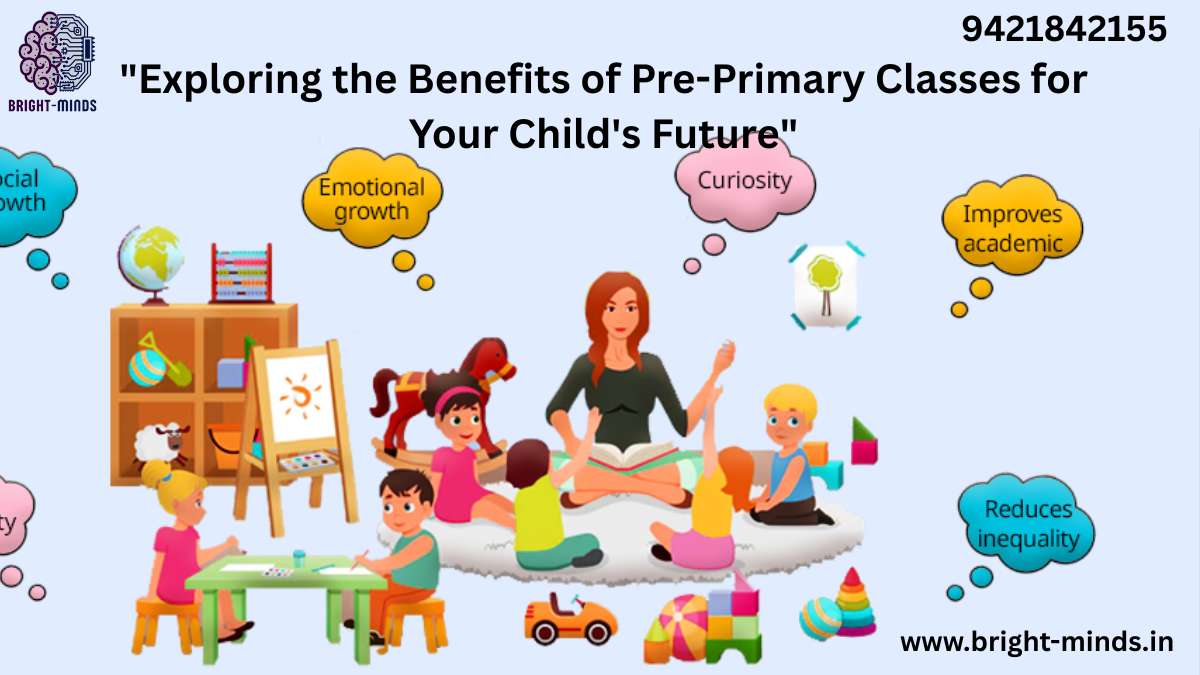In today’s fast-paced, competitive world, parents are more conscious than ever about giving their children the right head start in life. While education has always been a cornerstone of success, what’s changing is when that journey begins. Welcome to the age of pre-primary education, where structured learning starts before kindergarten and lays a powerful foundation for lifelong development.
But what exactly are pre-primary classes, and why are they considered crucial for a child’s future—not just academically, but socially, emotionally, and even financially in the long run?
Whether you’re a parent exploring your options, an educator, or a professional looking to understand how early education connects with long-term success, this guide will help you grasp the real value of early learning and how it shapes not just smarter students—but stronger, more adaptable adults.
👶 What Are Pre-Primary Classes?
Pre-primary education refers to structured early childhood programs for children typically aged 2 to 6 years, before they enter formal schooling (Grade 1). These classes include:
- Playgroup (2–3 years)
- Nursery (3–4 years)
- LKG – Lower Kindergarten (4–5 years)
- UKG – Upper Kindergarten (5–6 years)
These programs blend play with purpose, introducing children to a world of discovery, communication, motor skill development, and emotional intelligence.
💡 Did you know? According to UNESCO, 90% of brain development happens before the age of 6. That means what your child experiences in these early years directly influences their future learning abilities.
🧠 The Cognitive and Social Benefits of Pre-Primary Education
1. Faster Brain Development
Children in pre-primary classes are introduced to activities that improve:
- Language development
- Numerical understanding
- Cognitive processing
These skills are critical as they set the stage for complex learning in primary school and beyond.
2. Stronger Social Skills
Pre-primary programs encourage group activities, sharing, taking turns, and expressing feelings—fostering confidence, empathy, and interpersonal skills early on.
3. Better Emotional Regulation
Children learn how to manage separation anxiety, resolve conflicts, and handle emotions with the help of nurturing educators and structured routines.
4. Improved Fine and Gross Motor Skills
Activities like coloring, building blocks, and physical games help children develop coordination and muscle control, essential for writing, sports, and daily tasks later in life.
📈 Industry Insights: Why Early Learning Is a Growing Trend
Early childhood education isn’t just a parenting fad—it’s a booming global sector, backed by research and strong policy support.
🌍 Market Trends
- The global pre-primary education market is projected to grow at a CAGR of 9.3% by 2030.
- In India alone, NEP 2020 (New Education Policy) has emphasized the integration of Foundational Stage Learning (ages 3–8) as a critical reform.
🏫 EdTech Integration
With platforms like Byju’s, FirstCry Intelli, and Montessori-based apps, digital pre-primary learning tools are now more accessible than ever—bridging the gap between school and home.
👩💼 Corporate Support
Progressive companies are now offering childcare benefits and early learning resources for employees—realizing that when working parents are supported, productivity improves.
🌱 Real-World Impact: How Pre-Primary Learning Pays Off Later
Pre-primary education doesn’t just prepare your child for school—it helps shape their future personality, academic mindset, and even earning potential.
Let’s break this down:
| Early Learning Benefit | Long-Term Impact |
| Strong foundation in language & math | Better academic performance |
| Early socialization | More confident, team-oriented adults |
| Emotional awareness | Healthier relationships & stress management |
| Critical thinking games | Enhanced problem-solving and innovation |
| Discipline & structure | Greater workplace adaptability |
Example:
Meet Rhea, now a 21-year-old data analyst. Her parents enrolled her in a Montessori pre-primary program. According to her, the early lessons in patience, communication, and routine shaped how she manages client deadlines and team collaboration even today.
📝 Practical Tips for Parents New to Pre-Primary Education
If you’re considering enrolling your child in a pre-primary program, here’s how to start smart:
1. Observe Your Child’s Readiness
Look for signs of independence like feeding themselves, curiosity, or interest in group play.
2. Choose the Right Curriculum
Opt for programs based on Montessori, Reggio Emilia, or Play-way methods depending on your child’s learning style.
3. Visit Schools or Virtual Platforms
Don’t just go by brochures. Visit the campus or trial an app to observe the environment, faculty interaction, and child response.
4. Establish a Home Routine
Start practicing school routines at home—waking up, snack time, quiet time, and bedtime stories.
5. Involve Your Child
Talk positively about school. Use books or videos to help them understand what to expect in pre-primary class.
💼 Why Company Employees Should Care
If you’re a working parent, educator, or HR leader, pre-primary education isn’t just a personal decision—it’s a strategic investment in family and future success.
✅ For Working Parents:
- Early education means more structured days, giving you peace of mind and better work-life balance.
- Educated children tend to need less academic support later, reducing stress at home.
✅ For Employers:
- Providing resources or support for early education improves employee loyalty and retention.
- You empower future citizens and professionals by supporting your employees’ families today.
💡 How Pre-Primary Learning Connects to Financial Literacy
At first glance, early education and financial literacy may seem unrelated—but they’re deeply connected.
Children who learn discipline, structure, critical thinking, and problem-solving early are better equipped to handle complex topics like budgeting, investing, and goal setting later in life.
Encouraging goal-setting and basic numeracy in pre-primary years can lay the mental framework for financial success later on.
🧠 Example: A child learning to save “stars” or “tokens” for a reward is already grasping the basics of delayed gratification and value tracking—two critical financial habits!
you may be interested in this blog here:-
Phonics Worksheets for Kindergarten PDF Fun Literacy Stations!
class ukg englishclass ukg english question paperclass ukg english question paper pdfclass ukg english worksheetukg class ukg english question paperword meaning for class ukg english to hindi class ukg english paperworksheet for class ukg english

